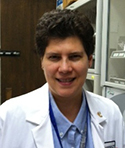Two recent trials demonstrated the safety and efficacy of risankizumab-rzaa for the treatment of adults with active psoriatic arthritis.


Michele B. Kaufman, PharmD, BCGP, is a freelance medical writer and editor. She is also a pharmacist at New York Presbyterian Hospital–Lower Manhattan campus. She has been a past guest lecturer at Touro College of Pharmacy in New York City for the Medical Writing elective. Dr Kaufman is a member of the New York City Society of Health-Systems Pharmacy, the New York State Council of Health-System Pharmacists, the Academy of Managed Care Pharmacy (AMCP)—Northeast Region Affiliate Chapter, the American Society of Consultant Pharmacists and the Empire State-Metropolitan NY Chapter of the American Medical Writers Association. She received her BS in Pharmacy from the University of Rhode Island (URI) College of Pharmacy and her Doctor of Pharmacy degree from Massachusetts College of Pharmacy and Allied Health Sciences in Boston. She also completed a Drug Information Fellowship at the URI Drug Information Center/Roger Williams Medical Center in Providence, R.I. Dr Kaufman is a registered pharmacist and is a Board-Certified Geriatric Pharmacist.

Two recent trials demonstrated the safety and efficacy of risankizumab-rzaa for the treatment of adults with active psoriatic arthritis.

Treatment with denosumab for patients with RA and glucocorticoid-induced osteoporosis led to greater increases in bone mineral density of the lumbar spine and hips of patients than treatment with risedronate.

The use of guselkumab improved joint and skin symptoms in biologic naive patients with PsA, according to research presented during ACR Convergence 2021.

In a phase 2 study, tigulixostat treatment proved safe for lowering serum uric acid (sUA) levels in patients with gout.

The FDA has approved the use of secukinumab for pediatric patients with enthesitis-related arthritis and psoriatic arthritis, after research showed a longer time to disease flare than placebo.

According to a German study presented during ACR Convergence 2021, treatment persistence with JAK inhibitors is comparable to TNF inhibitors and other bDMARDs among patients with rheumatoid arthritis.

In a study, patients with new-onset polymyalgia rheumatica (PMR) who were treated with subcutaneous tocilizumab were more likely to achieve sustained, glucocorticoid-free remission than patients who received placebo.

Researcher identified multiple factors for flare, including non-use of methotrexate, in patients with rheumatoid arthritis who had switched from intravenous (IV) tocilizumab to subcutaneous tocilizumab.

Patients who have undergone a kidney transplant and have high levels of serum uric acid symptomatic gout may benefit from treatment with pegloticase, according to a recent study.

Cyltezo (adalimumab-adbm) may be interchanged for Humira (adalimumab) for all indications, according to an October decison by the FDA. The FDA has also approved a new combination of celecoxib and tramadol for pain management.